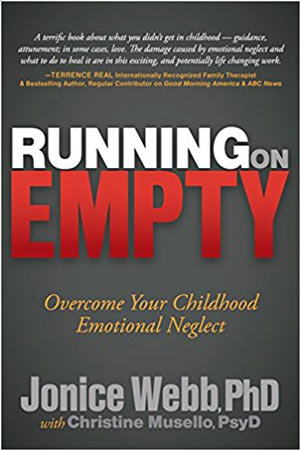Written by Jonice Webb PhD
Self-Care Strategies to Heal from Childhood Emotional Neglect
Many of us suffered Emotional Neglect from our parents to some degree or another. But you may not realize the effect this lack of nurturing, connection, and compassion has had on your adult life.
Adults who have been emotionally neglected often mislabel their unhappiness as something else: depression, marital problems, anger, or anxiety, for instance. Emotional Neglect can disrupt your health and personal life in devastating ways, from struggles with self-discipline and feelings of emptiness, to poor relationship skills and poor self-esteem.
But one thing adults who experienced Childhood Emotional Neglect have in common is difficulty taking care of themselves. An important component of selfnurturing is putting oneself first. Here are four ways to do it.
1. Learn to say no.
The people in your life have learned that you will be there for them, because that’s what emotionally neglected people do. Being a generous, compassionate person is wonderful, but sacrificing yourself too much by saying yes to things that deplete your time and energy is not. Remember this simple rule: Anyone has the right to ask you for anything, and you have the equal right to say no without giving a reason. Saying no when you need to, free of guilt and discomfort, is a vital building block of self-care.
2. Ask for help.
As an emotionally neglected child, you internalized your parents’ message: “Don’t have feelings, don’t show feelings, don’t need anything from anyone, ever.” If it’s hard for you to say no to others, it’s probably equally hard for you to ask them for help or a favor. To free yourself from this difficult bind, all you have to do is accept that other people don’t feel guilty or uncomfortable saying no, and they don’t have angst about asking for help. As soon as you can join them, a new world will open up for you.
3. Discover your likes and dislikes.
If you were emotionally neglected as a child, you may have difficulty knowing yourself, perhaps because your needs were not considered often and you weren’t invited to voice your preferences. As a result, you may have certain areas where you know yourself well, and others in which you’re mystified. If you’ve been focused outward for much of your life, you may not be able to identify your likes and dislikes, such as the types of people, food, and entertainment you most and least enjoy, or even the style of clothes, hobbies, and future aspirations that appeal to you. Your likes and dislikes are valid and important, so take the time to write them down.
4. Prioritize your enjoyment.
When you were growing up emotionally neglected, you probably weren’t allowed to make choices that led to your own enjoyment. Or, if your family was scrambling for resources, perhaps there wasn’t much left for fun things. In some ways, this last strategy encapsulates the previous three. In order to put a higher priority on your own enjoyment, you have to say no to requests that pull you too far away from it. You have to ask for help sometimes so that you feel enough support and connection to others to allow for opportunities, such as a movie or hiking companion. And you need to know what you like so you can seek it out. Think of one activity you’d like to pursue, and then follow up by taking action. Having more pleasure in your life will make you a happier person.
JONICE WEBB PHD is a respected psychologist and pioneer in the field of Childhood Emotional Neglect and its negative impact on adult behavior. A licensed psychologist since 1991, she has a private practice in Lexington, MA, specializing in the treatment of couples and families. Over the course of her career, Dr. Webb has worked in a variety of settings, including a psychiatric emergency service, substance abuse programs, and outpatient clinics. Running on Empty is her first book. Website: www.emotionalneglect.com


